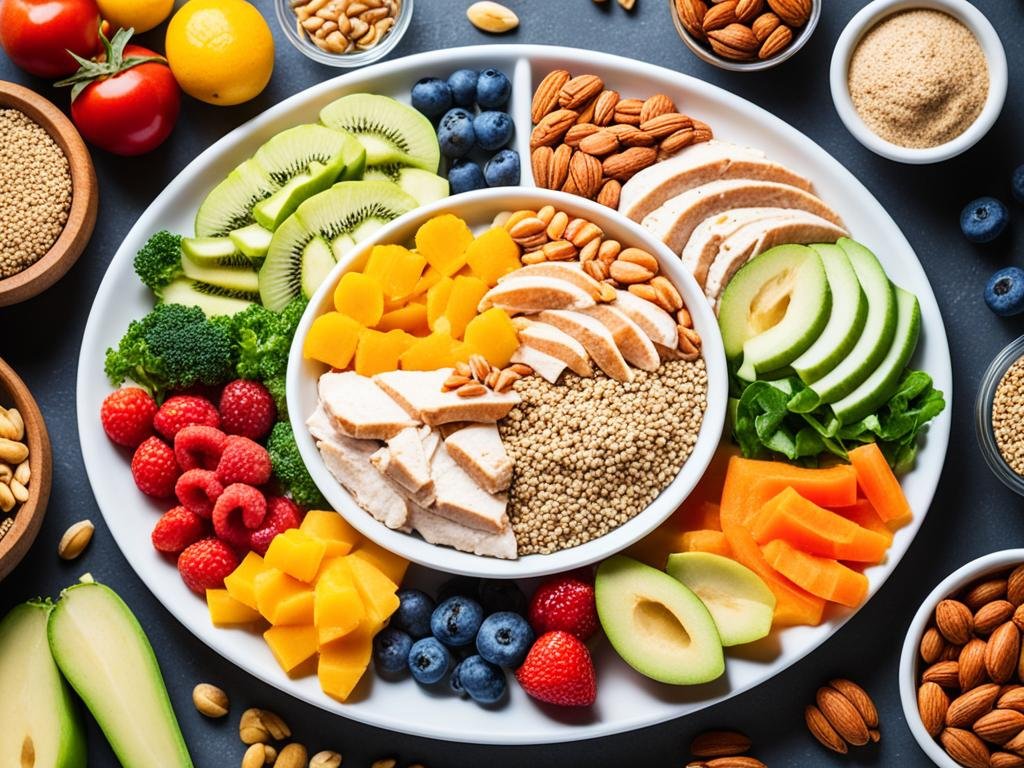Are you ready to transform your health and well-being through the power of a balanced diet? In today’s fast-paced world, making the right food choices can seem like an overwhelming task, but the payoff is undeniable. Up to 80% of premature heart disease and stroke can be prevented by adopting healthy lifestyle habits, and a nutritious diet is at the heart of this crucial prevention strategy.
According to leading health experts, a healthy diet should include a variety of nutritious foods, such as an abundance of vegetables and fruits, whole grains, and protein-rich foods, while limiting highly processed items. By making these simple adjustments, you can lower your risk of heart disease and stroke, improve your cholesterol levels, manage your blood pressure, and achieve a healthy body weight. Preparing most of your meals at home using whole or minimally processed foods, creating a weekly meal plan, and selecting recipes packed with fruits and vegetables are just a few of the top tips from the experts.
Key Takeaways
- A healthy, balanced diet is crucial for protecting your overall health and preventing chronic diseases.
- Incorporating a variety of nutrient-rich foods, such as vegetables, fruits, whole grains, and lean proteins, is key to a healthy diet.
- Preparing meals at home using whole or minimally processed ingredients can help you take control of your nutrition.
- Creating a weekly meal plan and choosing recipes with an abundance of fruits and vegetables can enhance the nutritional value of your diet.
- Adopting healthy eating habits can not only support weight management but also reduce your risk of heart disease and stroke.
But the real question is: Are you ready to embark on a journey towards a healthier lifestyle through the power of your plate? The path to a vibrant, sustainable well-being starts with the food choices you make every day. Dive in and discover the transformative impact a balanced diet can have on your mind, body, and overall quality of life.
Understand Your Calorie Needs
Achieving a balanced diet is essential for maintaining optimal health, and a key aspect of this is understanding your calorie needs. The energy balance between the calories you consume and the calories your body uses is crucial for weight management. If you consume more calories than your body needs, the excess energy will be stored as fat, leading to weight gain. Conversely, if you consume fewer calories than your body requires, you’ll experience weight loss.
Recommended Calorie Intake for Men and Women
According to health experts, the recommended calorie intake is around 2,500 calories per day for men and 2,000 calories per day for women. These figures serve as general guidelines, as individual calorie needs can vary based on factors such as age, activity level, and overall health status.
Monitoring Calorie Intake for Weight Management
Closely monitoring your calorie intake can be an effective strategy for achieving and maintaining a healthy weight. By being mindful of the foods and beverages you consume, you can make informed decisions that support your weight management goals. Incorporating calorie-counting tools or apps can help you track your dietary intake and ensure you’re meeting your recommended calorie needs.
Embrace Nutrient-Rich Foods
A healthy diet should be centered around a variety of nutrient-rich foods that provide essential vitamins, minerals, and fiber. This includes incorporating whole grains and high-fiber foods into your meals, as well as prioritizing fruits and vegetables and lean protein sources.
Emphasize Whole Grains and High-Fiber Foods
Starchy carbohydrates, such as potatoes, bread, rice, pasta, and cereals, should make up just over a third of the food you eat. It’s recommended to choose higher-fiber or whole-grain varieties, as they are more nutrient-dense and can help promote feelings of fullness and regular digestion.
Prioritize Fruits and Vegetables
Eating at least 5 portions of a variety of fruits and vegetables every day is an essential part of a healthy diet. These nutrient-rich foods are packed with essential vitamins, minerals, and fiber, which can support overall health and well-being.
Incorporate Lean Protein Sources
Including lean protein sources, such as fish, poultry, eggs, and legumes, in your diet can help build and maintain strong muscles, bones, and skin. Opt for lean protein options to keep your intake of unhealthy fats low.

Diet Suggestions for Optimal Nutrition
Maintaining a balanced and nutrient-rich diet is crucial for optimal health and well-being. One key aspect of this is ensuring a variety of fruits and vegetables in your daily intake. These vibrant, whole foods are packed with essential vitamins, minerals, and antioxidants that can help strengthen the immune system and reduce the risk of chronic diseases.
Variety in Fruits and Vegetables
The first source recommends eating a wide range of fruits and vegetables to ensure your body receives a diversity of beneficial nutrients. From crunchy carrots and leafy greens to juicy berries and crisp apples, incorporating a colorful array of produce can provide your body with a comprehensive array of vitamins, minerals, and phytochemicals. This fruit and vegetable variety can be an important part of an optimal nutrition plan.
Oily Fish for Omega-3 Fatty Acids
In addition to a diverse selection of fruits and vegetables, the diet suggestions for optimal health should also include oily fish such as salmon, trout, herring, and sardines. These fish are rich in omega-3 fatty acids, which have been shown to offer cardiovascular benefits and may help prevent heart disease. Incorporating oily fish into your healthy eating plan can be a simple yet impactful way to support your overall wellness.
Limit Unhealthy Fats and Sugars
When it comes to maintaining a healthy diet, it’s crucial to be mindful of your intake of unhealthy fats and added sugars. These dietary components can have a significant impact on your overall well-being and weight management efforts.
Reducing Saturated Fat Intake
The first step in limiting unhealthy fats is to focus on reducing your intake of saturated fat. Numerous studies have shown that regularly consuming high amounts of saturated fat can lead to elevated cholesterol levels and an increased risk of heart disease. To combat this, experts recommend using small amounts of vegetable or olive oil, or opting for reduced-fat spreads, instead of relying on butter, lard, or ghee, which are high in saturated fat.
Cutting Back on Added Sugars
In addition to monitoring your saturated fat intake, it’s also important to be mindful of your consumption of added sugars. Many processed and ultra-processed foods are laden with added sugars, which can contribute to weight gain, obesity, and even an increased risk of tooth decay. By focusing on whole, unprocessed foods and limiting your intake of sugary drinks, baked goods, and other high-sugar items, you can make significant strides in improving your overall healthy eating habits and supporting your weight management goals.

Mindful Eating Habits
Cultivating mindful eating habits can have a profound impact on your overall weight management and healthy lifestyle. One key aspect is eating slowly and savoring your food. Studies have shown that fast eaters are more likely to consume more calories and have a higher body mass index compared to slow eaters. By slowing down and truly tasting each bite, you’ll experience greater feelings of satiety, leading to reduced calorie intake.
Eating Slowly and Savoring Your Food
To practice eating slowly, try putting down your utensils between bites, chewing each mouthful thoroughly, and taking time to appreciate the flavors and textures of your meal. This mindful approach can not only enhance your enjoyment of the food but also support your weight management goals.
Portion Control Strategies
In addition to eating slowly, incorporating portion control strategies can be an effective way to manage your calorie intake. For example, the second source suggests that eating from smaller plates can make your portion look bigger, tricking your brain into thinking you’re eating more and feeling fuller. Additionally, the third source recommends keeping dressings, dips, and condiments on the side, allowing you to better control the amount you consume.
Plan and Prepare Meals at Home
Cooking more meals at home is one of the best ways to take control of your meal planning and healthy eating habits. By preparing home cooking, you’ll have a better understanding of the ingredients in your food and be able to make informed choices about what you’re consuming.
Meal Planning and Shopping Tips
To streamline your meal planning and shopping process, create a weekly menu and corresponding grocery list before heading to the store. This not only helps you save time but also prevents impulse purchases of less healthy items. Avoid going to the grocery store when you’re hungry, as this can lead to making less nutritious choices.
Healthy Cooking Methods
When it comes to healthy cooking methods, focus on techniques that minimize the use of added fats and oils, such as baking, broiling, roasting, and slow cooking. These methods can help preserve the natural flavors and nutrients of your ingredients while reducing the calorie and fat content of your meals.
Trying New Recipes Regularly
Introducing new healthy recipes to your repertoire is a great way to add variety to your diet and explore different nutritious foods. Experiment with a range of cuisines and cooking styles, from quick and easy weeknight dinners to more elaborate weekend dishes. Trying new recipes can also inspire you to incorporate novel cooking methods and discover new favorite healthy eating options.
Stay Hydrated
Maintaining proper hydration is essential for optimal health and well-being. As the human body is composed of approximately 60% water, ensuring adequate water intake is crucial for supporting various bodily functions, including regulating body temperature, aiding digestion, and flushing out toxins.
Water as the Primary Beverage Choice
Experts recommend making water your primary beverage choice throughout the day. Unlike sugar-sweetened drinks, which can contribute to weight gain and other health issues, water is a calorie-free, healthy option that helps to keep you hydrated without adding unnecessary calories to your diet.
Research has shown that even mild dehydration can impair physical and cognitive performance, making it important to stay well-hydrated, especially during physical activity or in warm weather. By making water your go-to drink, you can ensure your body receives the hydration it needs to function optimally.
While healthy beverages like unsweetened tea or coffee can also contribute to your overall water intake, it’s best to limit your consumption of sugary drinks, such as soda, energy drinks, and fruit juices, as they can be high in added sugars and provide little to no nutritional value.
Prioritize Breakfast
Starting your day with a healthy breakfast is a crucial component of maintaining a balanced diet and promoting overall well-being. A nutrient-dense breakfast can provide the energy and essential nutrients your body needs to function at its best throughout the day.
Nutritious Breakfast Options
Opt for breakfast choices that are high in fiber, protein, and complex carbohydrates, such as whole-grain cereals, oatmeal, eggs, and yogurt with fresh fruit. These nutrient-dense foods can help you feel fuller for longer, reducing the likelihood of overindulging later in the day, which can be beneficial for weight management.
For example, a bowl of wholegrain, lower-sugar cereal with semi-skimmed milk and sliced fruit can be a tasty and healthier breakfast option. Alternatively, an egg-based breakfast can be a satisfying choice, as research shows it may help reduce feelings of hunger and decrease calorie intake later in the day compared to a cereal-based breakfast.
By making breakfast a priority and choosing nutritious options, you can set yourself up for a productive and energized day, while also supporting your overall health and weight management goals.
Conclusion
In conclusion, following a healthy, balanced diet is one of the most important things you can do to protect your overall health and well-being. By understanding your calorie needs, embracing nutrient-rich foods, limiting unhealthy fats and sugars, practicing mindful eating habits, planning and preparing meals at home, staying hydrated, and prioritizing a nutritious breakfast, you can make diet suggestions that support a healthier lifestyle.
Incorporating these strategies can not only help you manage your weight but also reduce your risk of chronic diseases, such as heart disease and stroke. Adopting these healthy eating habits can contribute to a more vibrant and sustainable long-term well-being.
By making informed diet suggestions and embracing a balanced nutrition approach, you can take proactive steps towards achieving a healthy lifestyle and minimizing the risk of chronic disease prevention. Commit to these positive changes today and unlock the path to a more vibrant and sustainable future.

